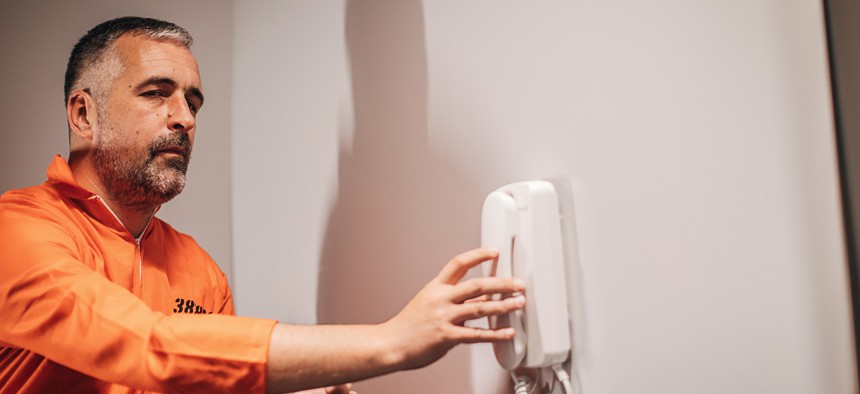Why Government Should Do More to Drive Down the Cost of Prison Calls

Getty Images/South_agency
COMMENTARY | Incarcerated people are charged exorbitant rates to make calls or send emails, making it difficult for them to contact loved ones. But more connection with the outside world could help in reducing recidivism.
Imagine having to decide between calling a loved one and buying food or medicine for yourself or a family member.
While this doesn’t seem like a decision that anyone in the United States should have to make, this scenario unfolds every day across America thanks to the for-profit communications service providers in our nation’s prisons and jails.
Basic communication services to incarcerated populations are primarily provided by three private companies. These companies can charge exorbitant prices for everything from sending an email to placing a phone call to receiving a recorded video message.
In Kentucky, where incarcerated people earn between 80 cents to $1.30 per day for prison labor, it costs $2.10 to make a 15-minute local or interstate phone call. You’d be hard pressed to find anyone in the “outside world” who needs to put in a full day’s work just to make a short call. But throughout much of the country this is the norm. On average, a 15-minute call from a state prison costs $5.74. Calls from some city and county jails can cost considerably more.
And how about sending an email, something most people can do without a second thought using a free email account?
In Indiana, an outbound email costs a whopping 50 cents. In Alabama, inmates are charged $3.75 for 25 “email stamps.” Each typed page of text costs one stamp, while receiving an inbound video message costs 10 stamps. Even in Democratic-run states, stamps are prohibitively expensive. Prisoners pay $7.25 for 30 stamps in New York, and $5.25 for 20 stamps in California.
Given low prison wages it is most likely the loved ones of those in prison—not the prisoners —who are footing that bill.
The prison communications industry is a $1.4 billion business. Its predatory profiteering practices overwhelmingly harm poor, Black and Brown people, given the overrepresentation of these communities in the carceral population. For relatives and loved ones of the incarcerated, the painful choice between a conversation with your brother or husband and necessities for your kids is all too common.
Why Should Governments Care?
Aside from the hiding-in-plain-sight price gouging and the disproportionate burden on the poor, why should people care about this? Because contact with the outside world helps incarcerated individuals avoid future criminality both inside and outside prison.
There is an intuitive logic here. We know that solitary confinement is harmful to mental health in large part because it minimizes interaction with other people. In the same way, if it is cost prohibitive for an incarcerated person to maintain regular communication with his or her loved ones outside prison, that person is at greater risk of isolation, and potentially, bad behavior borne of desperation.
The good news is that calls for reform have gained some traction. Last year, Connecticut became the first state to make calls from prisons and local jails free, following the lead of local jurisdictions like New York City, San Francisco, San Diego and Los Angeles, where similar efforts are poised to reclaim millions from corporate bottom lines. In New York City, the change will save prisoners and their families an estimated $8 million in phone charges and fees, and in San Francisco, $1 million in telephone charges could be offset.
But the stranglehold on the prison communications market remains substantial, and lawmakers must do more.
Federal authorities have already recognized the risk of anticompetitive behavior in the industry. In 2019, the Justice Department and Federal Communications Commission successfully killed a merger between two prison phone services monoliths, declaring it to be against public interest.
But three years later, there is still little competition in the prison communications industry. The three largest prison telecom service providers together control more than 90% of the market. Though the Martha Wright-Reed Just and Reasonable Communications Act—which would strengthen the FCC’s power to mandate “just and reasonable” communication charges—is a step in the right direction, a lot remains to be ironed out in that legislation, and the need for change is urgent.
The question is simple: Should we continue to allow the monopolistic practices that permit these companies to financially exploit a mostly poverty-stricken, mostly minority population?
If the answer is no, then it’s time for local, state and federal government actors—including the U.S. Department of Justice, the Federal Communications Commission and state and city level legislators—to step in, take a hard look at these companies and their practices, and mandate remedial action.
Rochelle Swartz is a senior associate at Orrick, and served as the 2021 Racial, Social, and Economic Justice Fellow at the Lawyers Committee for Civil Rights Under Law.
NEXT STORY: What We Know About Mass School Shootings in the US and the Gunmen Who Carry Them Out





